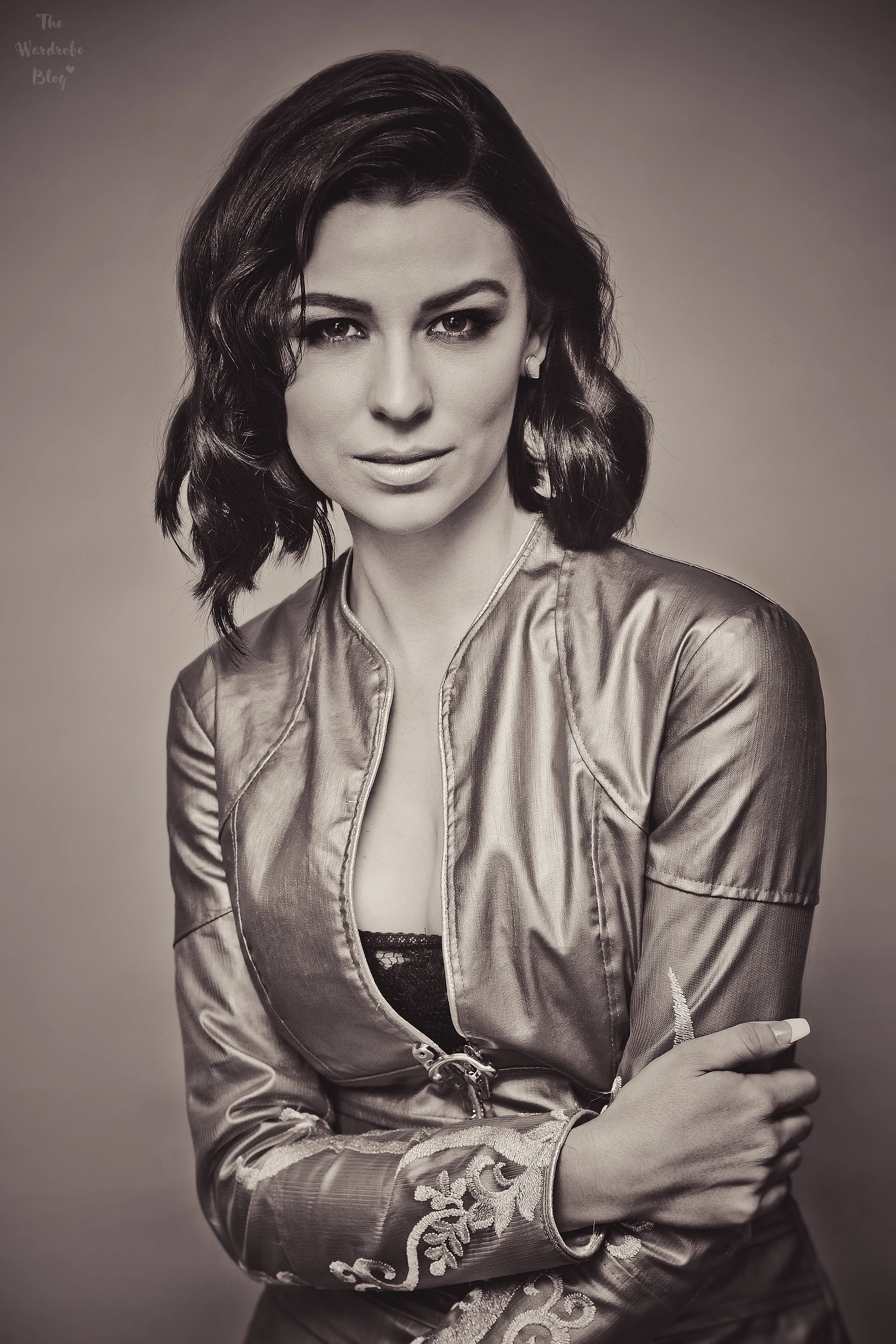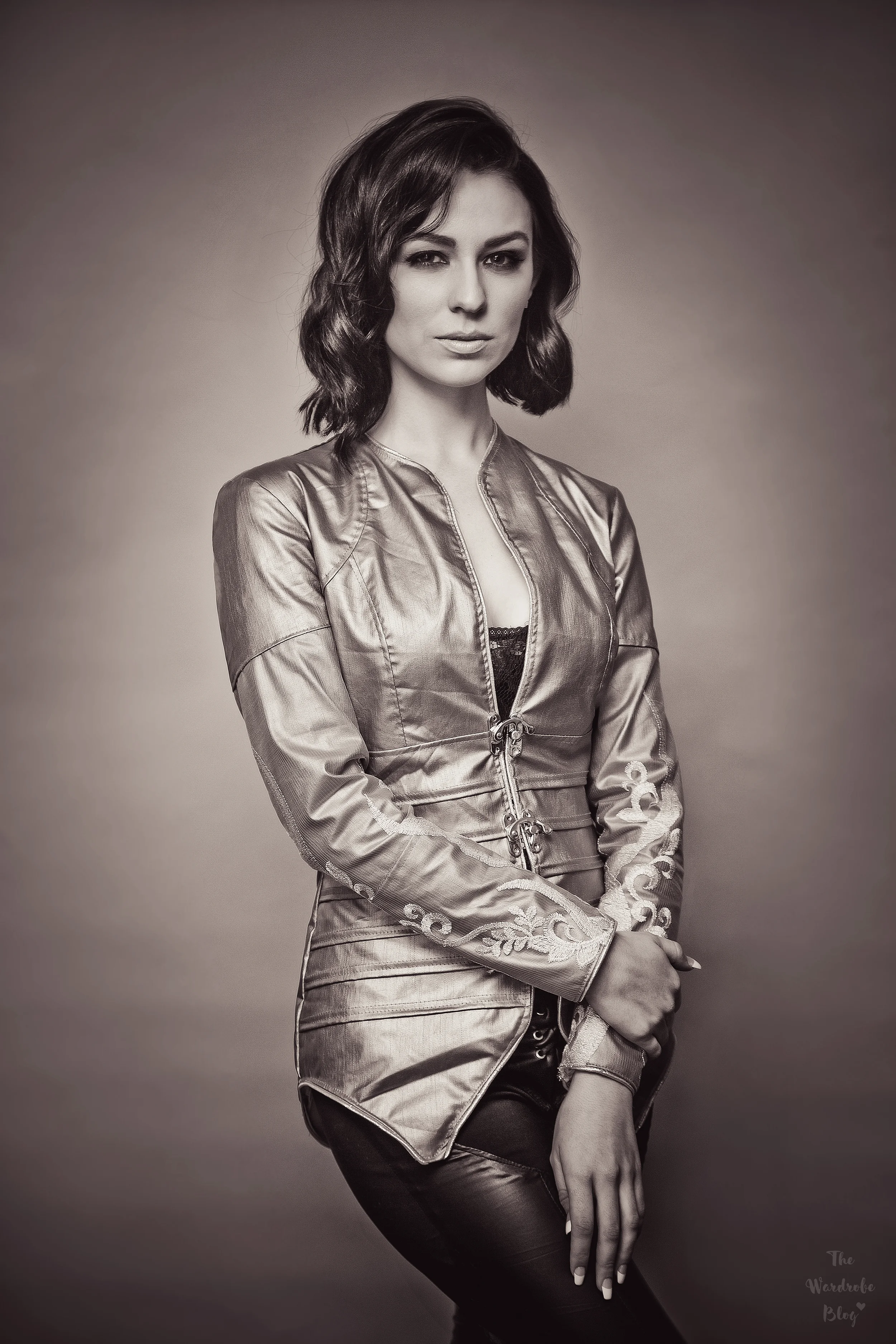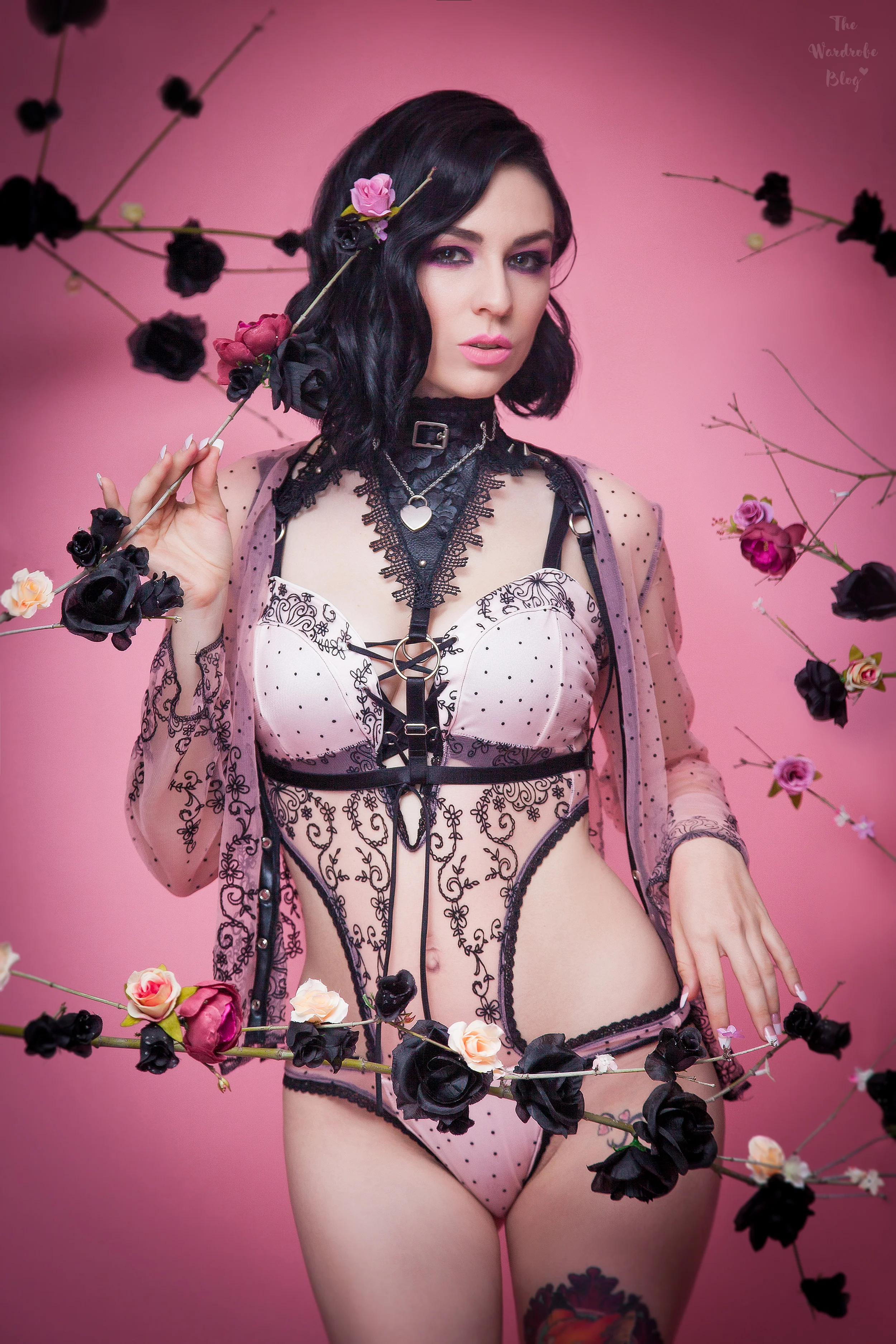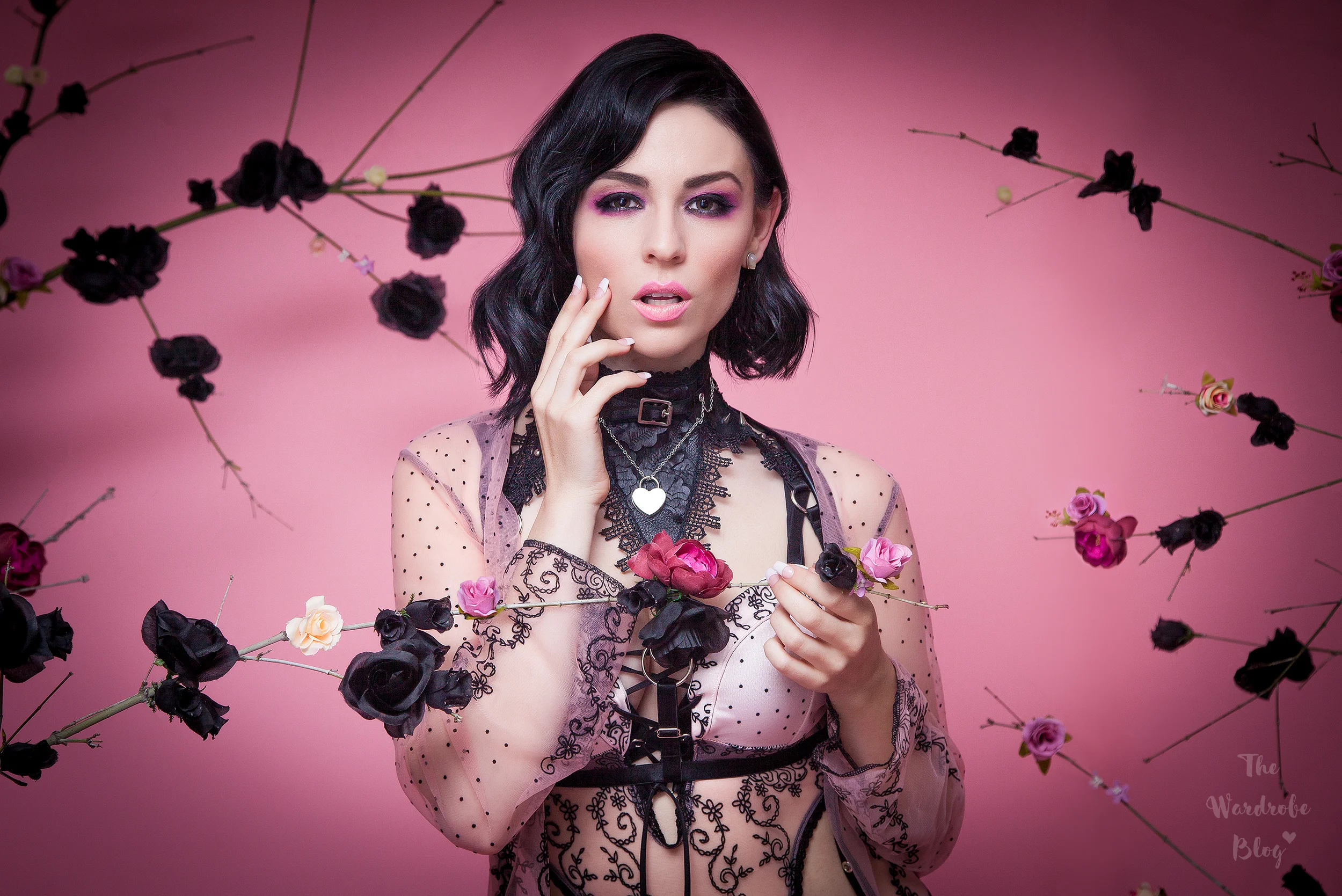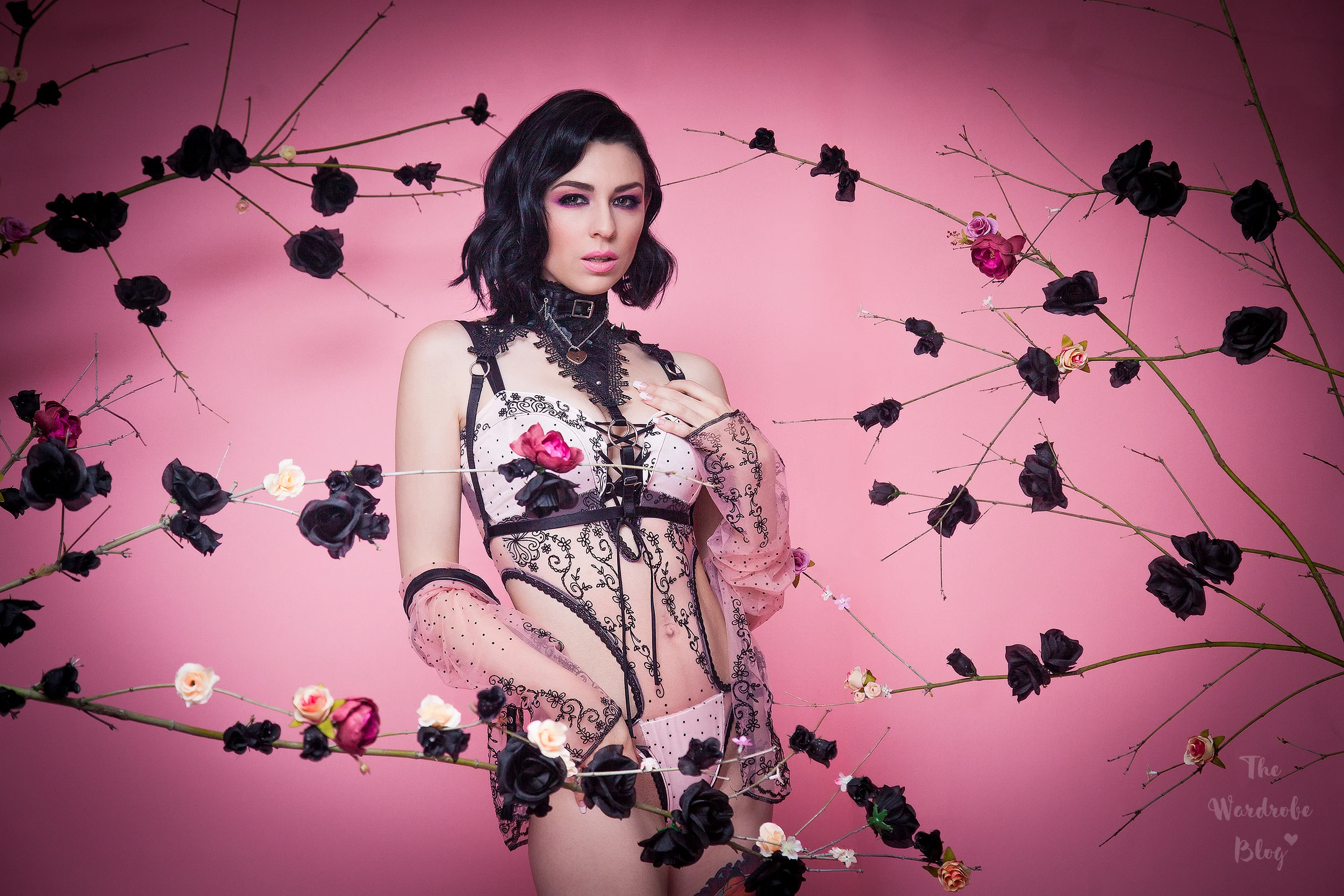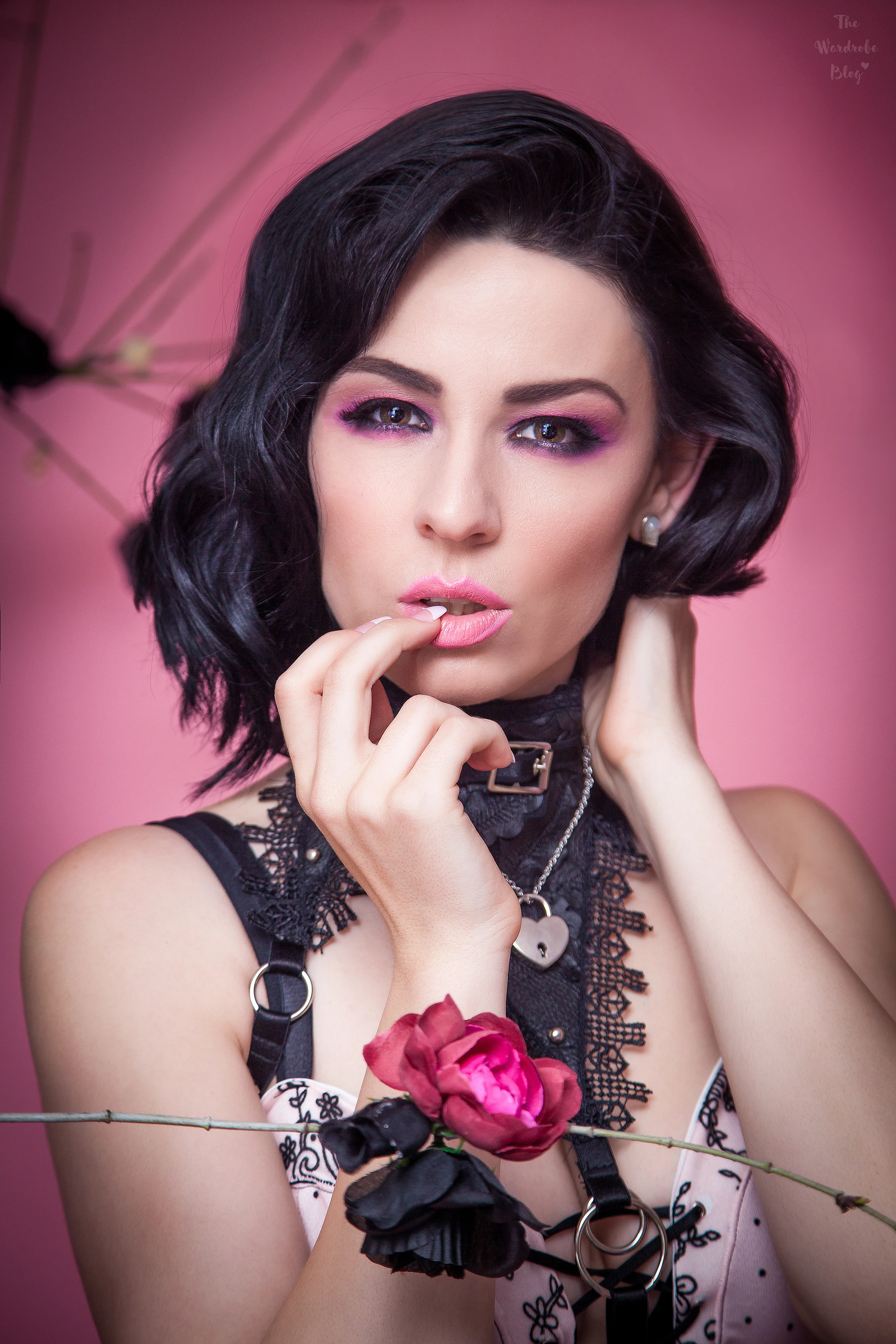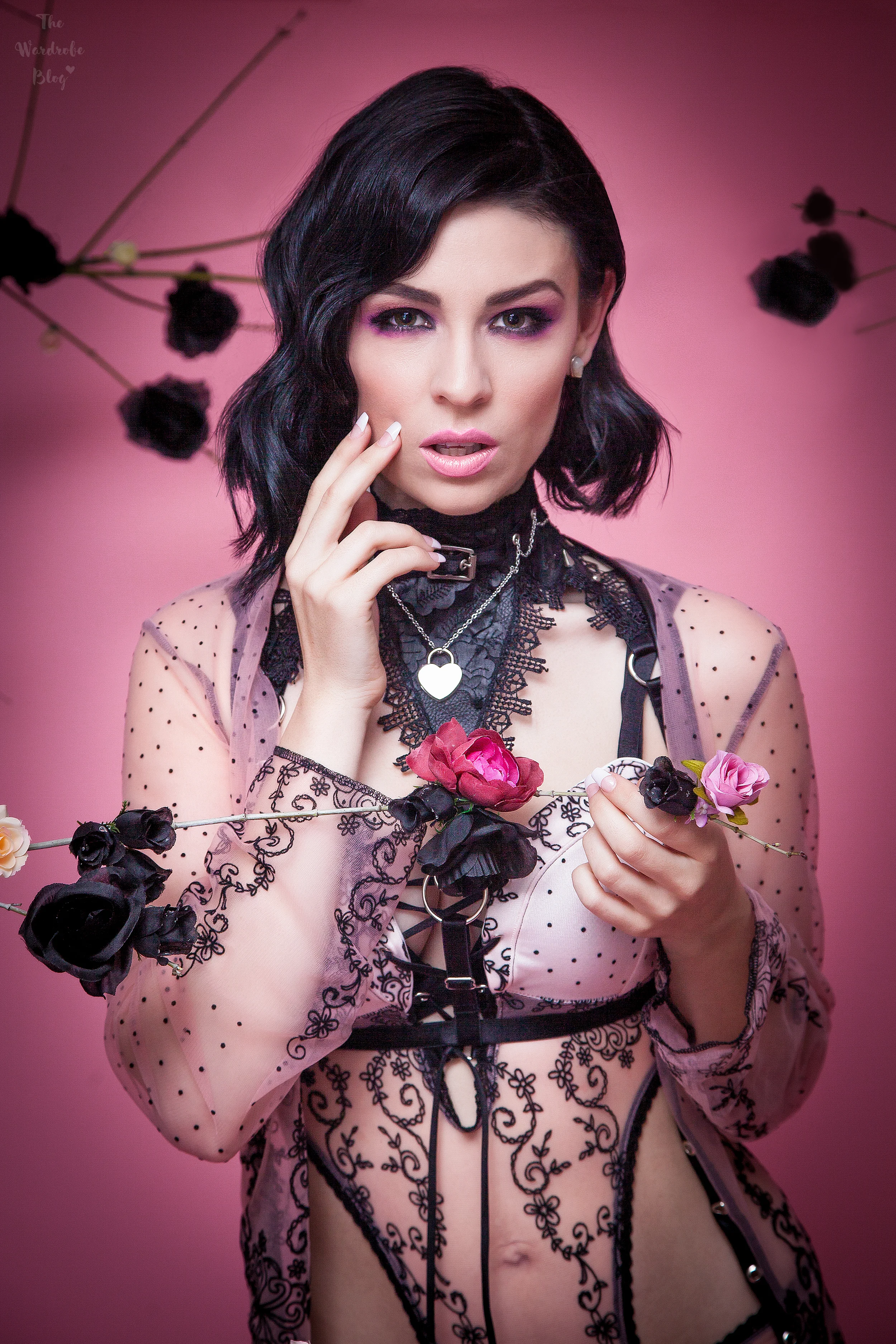Nicole Schmidt | Forgotten Lockett

Inspiration can be fleeting, but not for this Kiwi creator who is building her own empire with her unique creations piece by piece.
In this month's style feature, the beautiful, and vivacious Nicole Schmidt sits down to chat and share a number of poignant insights with me about her journey in the alternative fashion scene. A makeup artist, model and of course the designer and brilliant mind behind 'Forgotten Lockett'. A beautiful dark, but feminine collection of gothic inspired creations ranging from chokers, to clothing and accessories.
You can follow Forgotten Lockett on Instagram here, and Facebook here!
Nicole Schmidt | Style Feature
Nicole wears jacket by Forgotten Lockett www.forgottenlockett.com
20 Questions with Nicole Schmidt from Forgotten Lockett
How did Forgotten Lockett start, and why?
I think I always wanted to do it. I came up with the name years ago just after I graduated from Massey University around 2010. I did a diploma in fashion design and technology in Wellington and I loved it, even though I hated high school. University was the best experience, I had fantastic tutors. After my studies I was thinking about continuing on to the degree, but instead I landed a job in makeup with Revlon and went on to YSL, and Napoleon. So in the beginning I had the name, but I didn’t really know where to start. I had been stockpiling a lot of fabric and materials though, so what you're seeing now is probably the results of many, many years hoarding all sorts of things. Some patterns like the body suit design, I made over five years ago but I never did anything with it. I've done so many other designs and sometimes I put things down to come back to them later when I see them differently. That's the nature of being a productive procrastinator! I started creating for Forgotten Lockett about three years ago when I moved to Auckland. I decided to start on social media, and make my label public. There were a lot more opportunities in Auckland, so I juggled sewing part time as well as working in makeup on the counter, commercially, and also for the film industry. It came to a point where I just needed to take the bullet and jump. My mother is an artist as well, and she was gracious enough to offer to pay my rent, to see how far I could get. And that's what happened. I was able to find that perfect balance of just enough time, and just enough money. I was modelling part-time, working in makeup and my business was getting bigger. It all worked. Eventually I couldn’t stand doing it all anymore, because I started to fully realise that Forgotten Lockett was my real passion. I always knew it was deep down, but I had to have a taste of it really working for me. I quit my part-time job and decided to solely work off my label. It has been working for some time now, then I got pregnant! Now I am working my way back to that again.
Nicole wears custom lingerie set by Forgotten Lockett. www.forgottenlockett.com
[So when you made that transition into the aesthetic of what Forgotten Lockett is now, was that what you did in University?]
No, I was doing what everyone else wanted to do in Uni. Although I think people would still consider my work really weird. Some of my pieces were pretty strange! I made things like a giant bubble coat, and an oversized hooded piece that would drape on the floor. Everyone else would aim to make classic garments, like a pair of pants, but I didn’t want to do that. I tried very hard. But my designs didn’t fit in a box, and that’s what Forgotten Lockett was about. It’s why it’s been so good having my mother as an artist. She's just given me this window to figure out who I am. That’s how the label evolved. Partially the market guiding me, and also random inspiration I find. I go into my sewing room and create. From there and over a course of only a couple of years, key pieces have come out of it. The chokers, bodysuits, a selection of jackets. Pants are on the way. As my audience grows, I'll just make more and as I do I keep changing the designs. So it's evolving naturally which is so much better. It's really fun. I already know that even twenty years down the line, I will look back and feel this was the best part of it. This is the fun part of it. There are no limitations on what I'm doing. Nothing is necessarily wrong, nothing is stopping me from experimenting. My best customers are the ones that say. I trust you. Here's my money. I love those! So that’s how it’s happened, I’ve been in a naturally evolving process. I do feel that is what all leading designers do as well, except my work is much more alternative and a reflection of what inspires me, what I love as opposed to fitting into that commercial box. Surprisingly though, that commercial box is getting larger because of social media and my audience are finding me anyway.
How would you describe your aesthetic of Forgotten Lockett?
Dark, but whimsical. It’s gothic but there’s a real sense of romantic girliness about it. I’m not a typical goth, and it's not overly painful at the same time. It's still very sophisticated. But it's definitely breaking barriers. So I just class myself as alternative, gothic, industrial, and whimsical.
You have a lot of influences that you draw on, do you find it difficult to integrate them all?
I think it’s about having an artist’s eye, knowing what works together. It’s not usual to see something so harsh with something so soft. But if you have the balance correct, it works. Maybe that's just unique as to who I am and that's what I'm bringing to the table. Perhaps that's one of my skills that I have, it’s just what I love to do.
You've already talked a little bit about how your style and your brand has evolved. But how would you describe that process of your style or aesthetic changing, when you were younger did you have a different aesthetic than you do now?
Oddly enough no. Not really. I used to draw constantly, and my teacher of sewing in high school saw my book of work. She said to my mother in a parent teacher interview - “She's very creative and designs a lot but she's probably designing well above her age bracket. They're a bit too sexualized for someone this young.” So looking back on it, no. Probably because I was still designing the same, except I had no knowledge of how fabric worked. I had no knowledge of how something could be sewn. So that’s why university was great for me, to actually learn the practical skills. What a fabric can and cannot do, how to make a pattern and the possibilities.
[Could you tell me a little bit more about how that influenced your designs and the way you constructed things?]
It changed my designs because it made me realize what isn’t possible. There were certain things that I was trying to make that could not work. Then there were other times where I was just thirsty for that information. I needed that knowledge to get the ball rolling. There was no other way I could have done it without that knowledge. So it didn’t really change things too much, it just helped to light the fire. Now I can actually do what I want to do. I think it's very frustrating when you don't know how to recreate the vision in your mind. The hardest part for me is just slowing down. I used to have that problem at home and in university. I would always be told that I did really good work, just that I needed to slow my stitching down. There’s a famous saying that helped me. “A stitch in time saves nine.” I have so many ideas, so it’s about taking the time to finish each project and not getting caught up. Often things often don’t look good until you’ve actually finished them. Take them all the way to the end. Sometimes it's the detailing and the way you finish it. that can change the garment completely.
[You described yourself as a what was it that applied to be a productive procrastinator. I like that, isn’t that true to a lot of us creatives that we are juggling a lot of ideas.]
Yeah, and it’s a huge problem [laughs] but it's also not you know. It has it’s benefits. If you can keep yourself in line. I work in a very small, confined space and I get bored easily, so I literally just work around in a circle. Eventually, not just one garment is completed, but all of them are at roughly the same time. So I'll push through a workload and I’m normally working on multiple things at once.
[I think that touches on a really important point, so much of the time we can feel like certain things about us don’t fit or that we should be a different way, when it can often be an opportunity.]
I've been a very depressed person, I come from a family history of it and I thought I was just the weird one, that there was something wrong with me or that I'm just stupid. Because I'm dyslexic as well. I used to be in the bottom class for reading and it stuck with me. I thought I was just a worthless piece of society. Then when you actually go to work in society, you start to realise in fact it's okay. I’m actually doing really good, I’m at least moderate intelligence. I’m doing well. When I started working in the makeup industry it changed a lot of my perspective on what is achievable. When you see so many edited images, you think you’ll never look like that. But I gained experience with so many different skin types, you are so close that you are literally touching their skin, that you see all the pores, all the imperfections, and everyone is exactly the same. Everyone's got something that they hate about themselves, often it’s their best asset! People are so disillusioned from what’s actually real. That's what has been so great about working in the fashion and beauty industry, is that i've been able to see real people. It's given me confidence because I've stopped judging myself.
[True, some people would look at your images and how amazing you look and think it’s unreachable. But it's not, is it?]
I've been around models, and I've been a model and seen that everyone's different. Everyone's got a different shape. Everyone's got something to give. There’s a famous saying that I really like, which is that you cannot compare yourself to someone else. You cannot compare the sun and the moon. They are completely different and they each have their own time to shine. There's no comparison between the two. When someone asks how I am working in the fashion industry and surviving, I feel the number one rule is to do what you love, and do it yourself. Because you’ll fit into the world. There is a place for everyone that's my fundamental belief. If you know your passion or your calling, you will find your perfect little place in the world and people who love you for it. You just have to find your niche. It doesn't matter how obscure you are, how weird, stupid or ugly you feel. You are completely perfect in your own way. Everything will come to you that way, and that’s how it’s worked for me. Some of the things that I create, they may not be everyone's cup of tea but if I love them that’s what matters, and that’s why my work sells.
What's been your favourite piece you've worked on that is memorable for you?
I feel like that applies to a lot of things I do, like my chokers. I love them because they are so individual. No two are like. They’re the same pattern, but they’re all different colours, and styles. Some of the pieces are very unique because the materials I use are one of a kind. Sometimes I pick the decorations out from op-shops or pieces that wind up in my possession. That’s what I enjoy about each creation that I do, is the different elements that I have found along my path. So it's not just a process of making and designing, I’ve also been collecting and finding things too.
What's been the hardest part of your journey so far with Forgotten Lockett?
The hardest part has also been the fun part.That’s been discovering who I am, and discovering what I'm doing. Playing with new things like I’ve recently started learning about dragon scales and latex. So that’s been the hard part, finding new material but it’s also the fun part. Then working with that new material. I haven't really started massive work on the latex though because I'm struggling. [Laughs] It’s a whole new skill set, you can’t sew it. You have to glue it with adhesive. My last batch, I left the glue in my workroom and it became too hot and went solid… but this is part of the process. Teaching myself how to use new materials. It's learning and discovering that’s fun. But that’s probably the hardest part.
Is there anything that you wish you'd known then that you know now, when you started Forgotten Lockett?
I suppose I felt like I wished I was always more ahead of myself than I was. I often feel like I should have done more, or I should have started sooner. But then in saying that, it just wasn't the right time. It just happened as it happened. Coming from a childhood with such turmoil, and getting out of that I had a lot of lessons to learn in myself first, before I could even focus on work. Life has taught me a lot of lessons. That's why I think the baby came so soon too. I finally came to a point where I'm at peace with myself. I can take on that challenge now, but for many years I was trying to balance my emotions and learning to get rid of the anger I had. I was a very disruptive teen. When I was seven my parents divorced, and I fell into depression even as a child. I had suicidal thoughts. At the time I couldn’t really deal with it, so I struggled at school because I was also dyslexic. My dad was very religious, and I grew up in a Christian community. Mum eventually realized she was a lesbian, so they divorced. They were wonderful parents to me, even though they were so different. Mum became an atheist feminist, lesbian. My dad’s a very conservative Christian minister. But I still used to go to church, and they would pray over me for what they saw was my sinful mother. We’ve come so far now in society, in one generation we’ve fixed so much that gay marriage is legal. Imagine what two generations could do for the world. I came from extreme opposite parents, and although that was tough at times it didn’t cause the depression. That was associated with my belief system, and my spirituality. I fell into depression because I wanted to put my family back together, and because of my issues with God. I have a fundamental belief system that there is a God. I always have and I still do. But back then I didn’t understand, how can my mother be evil, and wrong, and go to hell being punished for eternity because of who she was made to be? It didn’t make any sense. So that's when I had a breakdown and I had to work my way out of it. It was a long journey, and spiritually I came right. I was angry for a long time though, because I wanted to change that part of me. I thought that the damage that had happened to me in my youth made me wrong in some way. But it’s not true, it’s the opposite. It was when an old friend came into my life again, that things changed. I feel like sometimes people come into our lives for a reason. She was abused as a child by her father, but she was the happiest and most outgoing person I knew. I asked her why she wasn’t angry at her father, how could you not be angry for what he's done to you? She said “You can’t live your life like that. I forgive him because I love him.” She asked me, “Do you love who you are? If you do then why are you fighting yourself? Just let it go.” Honestly. It was like a light bulb went off, it dawned on me that I do love who I am. So why am I trying to change myself? I feel that depression and anxiety, are a symptom of a larger cause. Something that needs to be resolved, whether it’s in your job, with your friends, or in your past. Again, it was about not trying to fit myself in a box that society wants me to be in. Since that time, I moved to Auckland and it’s all just started blossoming.
Let’s talk about your inspirations, who has inspired you, what designers have influenced your work?
I actually don’t like watching other designers. Sometimes it’s upsetting in all honesty because I compare myself to where they are at and feel like I should be doing better. Another part of me doesn’t want to copy or be influenced by them. So I suppose I find inspiration in whatever the moment is at the time, it could be something as simple as a song, my son picks up an interesting flower, visiting interesting places, the fabric I’ve found. Whatever moment I am in.
What advice would you give to other up and coming designers who are more alternative?
Social media is your biggest friend. Sometimes I hate it though, so try not to let it take over your life. It’s so important to grow your business. You really do need to have a separate business account and push it so people can see what you’re doing. Be visible on everything, I’m on Etsy, Instagram, Facebook, everything. I get most of my business from Facebook, and Etsy for international customers. Then make sure to share your pages and your imagery. You can do a lot of things by just sitting on your phone.
Have you experienced much criticism, how have you handled that?
No, that’s what I’ve probably found the most shocking. Next to none! My biggest critic has been myself, or my immediate family. [Laughs] Maybe that comes when you get more popular, because I’ve had none. Maybe I just tune out and don’t listen. If you’re focused on something, just work on it and stay in your own lane.
What’s your favourite part of the creative process?
I like designing, but the sewing part I truly love, it’s a form of meditation for me. I just switch off and sew. I’ll have my headphones in, listening to music and I could continue for hours. It’s therapeutic for me. Sometimes it’s frustrating if things don’t go well, like if I break a needle. But generally it’s really relaxing. My other favourite part is the satisfaction of the end, when it’s completely done and I can’t put any more of myself into it. I sit back and I’m absolutely physically exhausted, but it gives me the biggest smile. My hands are sore, I’m covered in fluff but it feels good. It’s that sense of relief, when you’re really creative and you’ve got so much energy that when you get to the end of it you’ve got nothing left to give, that’s bliss.
[It must be a big motivator to keep you going, although I often don’t find the same sense of a conclusion with my work, I’m always looking for what I need to change. Do you experience that?]
That’s natural though, a lot of people feel like they need a change. Everyone feels like that sometimes, I still feel like that at times because you can always do better. I think what you need to keep in mind is this is as good as you can do at this time. It’s a perfect thing in this moment. It’s about learning to draw a line and then move on. You haven’t lost anything, you’ve only learned and added to your skillset.
What’s the best advice you've ever received?
Apart from the friend who helped me when I was younger, the one that pops in my head is from my Nana who used to be a beauty Queen. I used to be really nervous when I would get on stage sometimes as a model. She’d say “darling, just be a swan. Be beautiful and elegant on the top and pedalling underneath, because no one can see your heart racing.” Now that’s pretty much my approach to life, because no one can see me underneath freaking out. It’s also about being confident, because no one can see your internal self. Everyone feels that they are vulnerable sometimes, but no one truly knows how you are feeling inside.
Is there a common misconception that people have about your work?
Just that I do so much, like I am a model and the face of my brand as well as the designer. That comes across a lot. People often don’t realise how multi-dimensional I am with the number of things I do.
[How do you deal with that?]
I just let my work speak for itself. You don't actually have to say anything. You can just hand over your card [Laughs].
What was your biggest failure, what did you learn from it?
I don’t really see anything as a failure because you fail your way to success! You truly do.
So what would you see as your ‘best’ failure?
Everytime something goes wrong you've now learned something. Well done, then you can incorporate it into the next thing. That’s how self taught is done, you fail your way to success. I feel that's how it should be done. That's how all the most successful people approach it. Some are big mistakes, some aren’t. I don't know what my biggest mistake is, perhaps putting myself out too much. Saying yes to people, especially to photographers, because there’s so much work that goes on behind the scenes. I'm not your typical model. There’s the outfit, makeup, and so much preparation that goes into every shoot I do.
What is your greatest success?
It’s two things, nothing that huge though. One is getting into magazines, not just for modelling but also my garments. The other one is just the amazing effect of word and mouth, how my brand has grown. It’s just the feedback I get when people love it, that’s success to me. Every sale is a success. I always jump for joy when I make a sale, and when new stores take in my pieces.
What do you do when you're not working or blogging?
That's all I would be doing normally, because it's my outlet. Raising my little boy, and spending time with my family.
Is there a person that you admire the most, fictional or real?
I'm not a very starstruck kind of person. Again I think everyone is just different, it's just how I view the world. However Alexander McQueen was always my favourite designer. Even more so after he committed suicide. It's horrible to say, but I can understand why he did it. The fashion industry is a very hard industry to be in. It is that constant pressure of doing something new all the time. When he died, he believed he just couldn't think of anything new. He killed himself for the love of his work. He was way ahead of the trends, but there’s very few other designers I really look at.
What is your biggest strength and weakness?
Weakness is an easy one. My energy levels are often down, I’m fatigued all the time because I can’t keep up with myself. I think that's the nature of being dyslexic. Mentally you're going so fast but your body can't keep up. I can't find the time or the energy to keep up with my ideas. My biggest strength is having an open nature to things, being present and flexible. Again, it’s about not being in that box, being really open to new things. Anything can be something, anything can be an opportunity. That’s also what makes it hard though, saying no because there are so many opportunities.
What is next for you?
Just keep going, because after giving birth to my son Daniel, I still have to keep moving forward. The next big step will be moving into mass production. I'm looking into that and I've got the funds for it. Now it’s just a matter of deciding what I want to mass produce, because some pieces are better as one offs. Also because a large portion of my work is made of things I have found or collected, how I can reproduce these is a big question. I just need to experiment a little bit more. That’s the next big thing to struggle with, the thought of working within that box! I’m looking for it to unfold itself naturally.
How do you want to be remembered?
I'd love to be as big as Coco Chanel. I’d like to be seen as a visionary, or a humanitarian. I just want to have the resources to change the world. I want to be rich so I can fix things. As much as I want Forgotten Lockett to be it’s own self, I also want it to fund all these other wonderful things, so I can make a difference in people’s lives. It’s what I want to do and what I feel everyone should do.
[That’s really impressive, always dreaming bigger than the biggest thing you’re doing in the moment.]
It’s true, I believe you've got what's called the higher mind or soul consciousness. That helps you manifest things. Whatever the highest thing that you could achieve with your physical body now, is just the floor for your higher mind. So set your goals as high as you can possibly imagine. Shoot for the moon, because at least you will fall somewhere in the stars. Dream big, and always work hard
Love my images? If you'd like to get in touch regarding photography, please contact me on my business website:
THE UNDEFINED PHOTOGRAPHY
Living the creative life in Christchurch, the south island of New Zealand with adopted family of pet pigeons, rescue hedgehog, and Mashmello the ringneck dove as featured on Ellomashmello.
Katherine is the New Zealand creator of ‘The Wardrobe’ and face of the blog & shop. Artist of wonder for ‘Katie Marvel’ the whimsical slow made fashion label, she is also the owner & photographer of portraiture, places and projects for ‘The Undefined Photography’ and maker of music for ‘Kaatje’.
The editor of The Beauty Blog New Zealand, she is the curator of multiple creative online communities including Slow Made Style, New Zealand Creators, and Pusheen The Cat Loves fan community with more to come...
